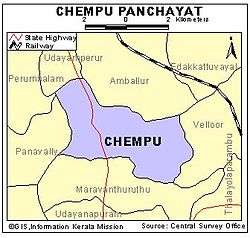Chempu
| Chempu ചെമ്പ് Chempu Angadi | |
|---|---|
| village | |
|
Map of Chempu Panchayath | |
| Nickname(s): Angadi | |
| Coordinates: 9°48′26″N 76°23′49″E / 9.80722°N 76.39694°ECoordinates: 9°48′26″N 76°23′49″E / 9.80722°N 76.39694°E | |
| Country |
|
| State | Kerala |
| District | Kottayam |
| Government | |
| • Type | Democracy |
| Area | |
| • Total | 18.42 km2 (7.11 sq mi) |
| Population | |
| • Total | 18,828 |
| • Density | 1,022/km2 (2,650/sq mi) |
| Languages | |
| • Official | Malayalam |
| Time zone | IST (UTC+5:30) |
| PIN | 686608 |
| Vehicle registration | KL-36 |
| Nearest city | Kochi |
| Literacy | 90% |
Chempu (SH-15, Kochi-Kumarakom road) is a village near Vaikom in Kottayam, Kerala, India. It is bounded by the shores of the Lake Vembanad, and is crossed by various distributaries of the River Muvattupuzha.
Demographics
It is inhabited by people of all communities including Arayans, Christians, Dhewars, Ezhavas, Muslims, Nairs and Namboothiris. People from Chempu include the warrior Chempil Arayan, the archbishop Mar Augustine Kandathil, the writer Chempil John, and the film actor Mammootty.
Etymology
The story behind the origin of name of the place is interesting. This place was an area of fishers and most of the population led their livelihood through fishing. The Brahmins who lived here were used to call the fish as 'Champa', consequently developed as Chempu.
History
Chempu is a historically important place, as it is the birthplace of Chempil Arayan. He was the captain of the army of Veluthampi Dalawa, the Travancore king. He was the first martyr from Tranvancore in the Indian Independence Movement.[1] t
The "Illi fort" , which starts from the north-western corner of Brahmamangalam to the east owns a key role in the history of the Travancore kingdom.This fort was built during the construction of the Travancore kingdom by Marthandavarma between 1742 and 1756.The fort was used to determine the boundary between the Kochi kingdom and thereby to ensure the protection of Travancore.This was under the supervision of Ramayyan Dalawa, who was the minister of Marthandavarma.
Geography
It lies at the north-western corner of Kottayam district and the Vaikom Taluk. The village is divided into three sections: Chempu, Kattikkunu, and Brahmamangalam. The North of the village is covered by Udayamperoor and Amballoor, the East by Velloor, South with Maravanthuruthu, and the West with Vembanad lake. Murinjapuzha in an intermediator between Chempu and Kattikkunnu.
Although Chempu is not an island, it is considered as a peninsula the Vembanad and Muvattupuzha river cover Chempu. Murinjapuzha bridge as the bridge which connects Kattikkunnu with Murinjapuzha (Chempu) Its distance from Kottayam is 38.4 km and from Vaikom, 6.5 km.
Distance to Chempu
| From | Distance(km) | Time |
|---|---|---|
| New Delhi | 2770 | 41 hours |
| Thiruvananthapuram | 194 | 3 hours 55 minutes |
| Cochin | 26.2 | 34 minutes |
| Kottayam | 38.4 | 53 minutes |
| Vaikom | 6.5 | 11 minutes |
Topography
Chempu has cool climatic conditions. The presence of the river and lake make the soil more fertile and yielding. The main crops here are coconut, mango, etc. The topography of Brahmamangalam is entirely different from that of Chempu and Kattikkunnu. This area has more resemblance to Kottayam topography. Here the main crop is Rubber.
The average temperature here is around 27 °C and the humidity is 81%. The wind here blows from the west with an average velocity of 6 kmph
Economy
The main occupation of Chempu natives is fishing.
Personalities
Mammootty(film actor)- He has been awarded the National Film Award for Best Actor three times. He has also won five Kerala State Film Awards and eleven Filmfare Awards. He was the first (1998) Malayali actor to be honoured with the Padma Shri for his contributions towards the arts.[4] He was also honoured a Doctor of Letters by the University of Kerala in January 2010[5] and by the University of Calicut in December 2010.[6] Vanitha, in 2004, chose Mammootty as the actor with the highest sex appeal in Kerala, following a survey among its readers.[7][8][9][10]
References
| Wikimedia Commons has media related to Chempu. |
- ↑ paragraph
